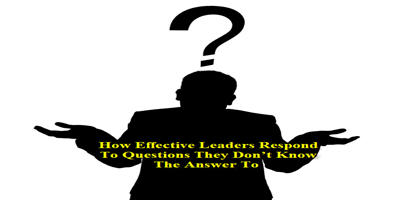Nobody knows everything. Leaders depend on assistants, team members and/or staff to serve as a reservoir of information that the team or organization needs to carry out its mission. Whether you are a CEO, a staff member, team member or a fellow member, you will eventually get asked a question that you don’t know the answer to. The way you respond goes a long way toward elevating or eroding your credibility, influence, and perception of your competence as a leader. Here are the obvious things leaders should not do when asked a question they do not know the answer to:
- They should not lie.
- They should not make up an answer.
- They should not say “I don’t know.”
Isn’t number three contradictory to the first two? Not at all if you are skilled at a leader-level response. Here are several ways you can and should respond when you do not know the answer:
- “Let me get back with you because I want to do a bit more research to make sure I can be as accurate as possible with my response.” In this case, you bought time without looking like you are out of the loop.
- “I’m actually not the best person to ask but I’ll get you an answer. I’ll be back in touch soon.”
- “Due to confidentiality, I’m not at liberty to share. You need to see ______________.” Don’t use this response if you have no knowledge. This is a situation where you don’t know details and it may be that you are not supposed to know. You are not saying if you know or not. You are just pointing them to the correct source without appearing to be out of the loop.
- “I’m not totally sure but I can find out and get back with you.”
- If you have incomplete information… “My understanding is _______________, but I’m not the authority on that question. You need to speak with _____________. Do you want me to help you get connected with them?”
Remember this as a leader. When you say, “I don’t know” it makes you look weak. If you say, “I don’t know” as a way to damage the other person or team to undermine them or to make yourself look better, that is at best poor demonstration of leadership skills and at worst insubordination. You will not always know the answer but a skilled leader will not appear unaware or be lacking in knowledge. While you should be honest you should not forfeit the perception others have of your competence or do damage to other decision makers by saying “I don’t know.” One last thing. I am not talking about trivia here. “What did the president have for lunch yesterday?” I don’t know and it doesn’t matter. You’re smart enough to make that distinction of when it matters and when it doesn’t. And you will if you desire to maximize your leadership!


That is a great word. Thank you.